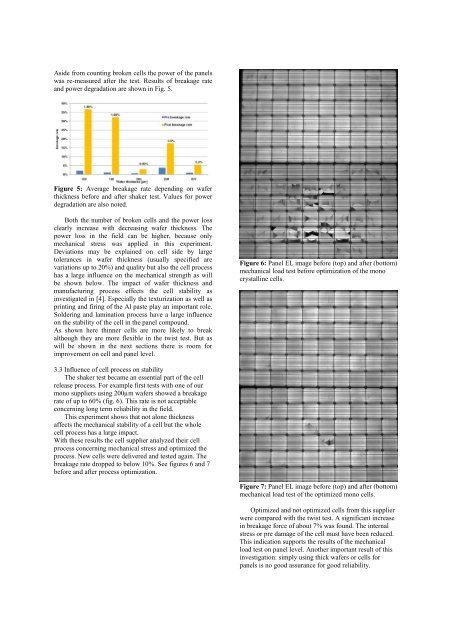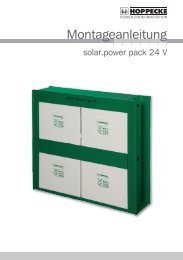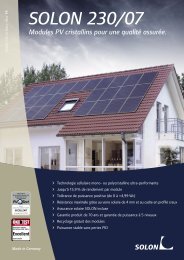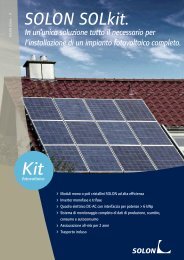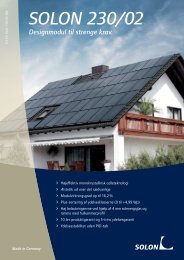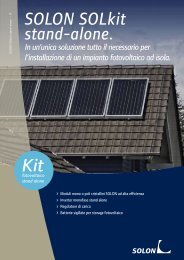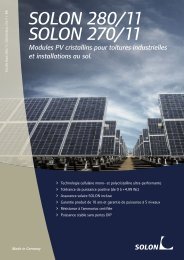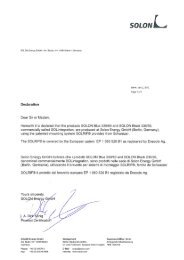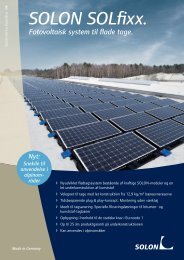mechanical stability of solar cells within solar panels - Solon
mechanical stability of solar cells within solar panels - Solon
mechanical stability of solar cells within solar panels - Solon
You also want an ePaper? Increase the reach of your titles
YUMPU automatically turns print PDFs into web optimized ePapers that Google loves.
Aside from counting broken <strong>cells</strong> the power <strong>of</strong> the <strong>panels</strong><br />
was re-measured after the test. Results <strong>of</strong> breakage rate<br />
and power degradation are shown in Fig. 5.<br />
Figure 5: Average breakage rate depending on wafer<br />
thickness before and after shaker test. Values for power<br />
degradation are also noted.<br />
Both the number <strong>of</strong> broken <strong>cells</strong> and the power loss<br />
clearly increase with decreasing wafer thickness. The<br />
power loss in the field can be higher, because only<br />
<strong>mechanical</strong> stress was applied in this experiment.<br />
Deviations may be explained on cell side by large<br />
tolerances in wafer thickness (usually specified are<br />
variations up to 20%) and quality but also the cell process<br />
has a large influence on the <strong>mechanical</strong> strength as will<br />
be shown below. The impact <strong>of</strong> wafer thickness and<br />
manufacturing process effects the cell <strong>stability</strong> as<br />
investigated in [4]. Especially the texturization as well as<br />
printing and firing <strong>of</strong> the Al paste play an important role.<br />
Soldering and lamination process have a large influence<br />
on the <strong>stability</strong> <strong>of</strong> the cell in the panel compound.<br />
As shown here thinner <strong>cells</strong> are more likely to break<br />
although they are more flexible in the twist test. But as<br />
will be shown in the next sections there is room for<br />
improvement on cell and panel level.<br />
3.3 Influence <strong>of</strong> cell process on <strong>stability</strong><br />
The shaker test became an essential part <strong>of</strong> the cell<br />
release process. For example first tests with one <strong>of</strong> our<br />
mono suppliers using 200µm wafers showed a breakage<br />
rate <strong>of</strong> up to 60% (fig. 6). This rate is not acceptable<br />
concerning long term reliability in the field.<br />
This experiment shows that not alone thickness<br />
affects the <strong>mechanical</strong> <strong>stability</strong> <strong>of</strong> a cell but the whole<br />
cell process has a large impact.<br />
With these results the cell supplier analyzed their cell<br />
process concerning <strong>mechanical</strong> stress and optimized the<br />
process. New <strong>cells</strong> were delivered and tested again. The<br />
breakage rate dropped to below 10%. See figures 6 and 7<br />
before and after process optimization.<br />
Figure 6: Panel EL image before (top) and after (bottom)<br />
<strong>mechanical</strong> load test before optimization <strong>of</strong> the mono<br />
crystalline <strong>cells</strong>.<br />
Figure 7: Panel EL image before (top) and after (bottom)<br />
<strong>mechanical</strong> load test <strong>of</strong> the optimized mono <strong>cells</strong>.<br />
Optimized and not optimized <strong>cells</strong> from this supplier<br />
were compared with the twist test. A significant increase<br />
in breakage force <strong>of</strong> about 7% was found. The internal<br />
stress or pre damage <strong>of</strong> the cell must have been reduced.<br />
This indication supports the results <strong>of</strong> the <strong>mechanical</strong><br />
load test on panel level. Another important result <strong>of</strong> this<br />
investigation: simply using thick wafers or <strong>cells</strong> for<br />
<strong>panels</strong> is no good assurance for good reliability.


